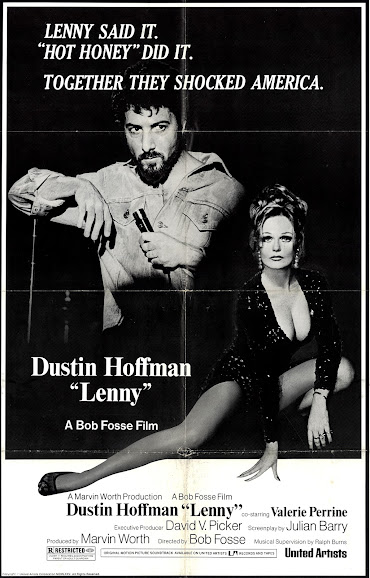Bruce on the loose
Monday, June 27, 2022
Bob Fosse’s filmography isn’t extensive, as he only helmed a handful of pictures between 1969 and 1983 prior to his untimely death. One of the standouts in his cinematic resume is Lenny, a 1974 biopic starring Dustin Hoffman and Valerie Perrine. Our CineVerse squad recently used the wayback machine to explore this movie, which generated several observations, summarized below (to listen to a recording of our group discussion, click here).
What did you find memorable, satisfying, unexpected, distinctive, or curious about Lenny?
- The filmmakers employ unconventional techniques to tell this story, including using stark black and white photography, elliptical editing and jump cuts, vignettes, a verite documentary style, talking-head interviews with characters conducted by the film’s director (that’s Fosse’s offscreen voice you hear), and long, uninterrupted takes (such as when Bruce attempts to perform while inebriated).
- Blu-ray.com reviewer Jeffrey Kauffman wrote: “Fosse tosses together elements from Lenny and Honey's lives almost willy nilly at times, adding to the drug-fueled ambience of the piece. Timeframes flit to and fro, offering contrasts between Lenny's relatively innocent younger years and the more jaded ‘elder; he became in a rather short amount of time.”
- The language is frank and the content decidedly adult. Even for a 1974 film, the profanity and ethnic slurs are thick, there’s ample nakedness (including full frontal nudity of a dead Lenny Bruce), and we are shown graphic and disturbing imagery like an extended shot of a needle entering a vein.
- The filmmakers aren’t necessarily trying to lionize Bruce or depict him as a martyr to the cause of comedy and the First Amendment. Fosse shows Bruce warts and all, underscoring the toll his drug use, sexual proclivities, nonconformity, and other choices make on his personal life, health, and relationships.
- National Review critic Kyle Smith wrote: “In Fosse’s unsentimental vision, Bruce is not a victim. He is relentlessly the agent of his own destruction, one of the many entertainers who behaved as though the rules didn’t apply to them. The rules had other ideas. Fosse (a Methodist) saw indulgence and doom as sensuously intertwined, aware that his uncontrollable hedonism amounted to digging his own grave and yet fascinated to watch as if from a seat in the audience. That is the subject of both Lenny and the undisguised autobiographical film that followed, All That Jazz (1979).”
- Interestingly, the movie is often told through Honey’s recollections and flashbacks, suggesting that she is the primary surviving witness to the life and legacy of Lenny Bruce. We also get recollections from Bruce’s manager and mother. But we know that Honey was a problematic drug addict, so she in particular may not be the most reliable narrator.
- The performances are memorable, but especially Valerie Perrine as Honey, who shows incredible range and emotional depth.
- Some critics have suggested that this film was a reflection of Fosse’s own life in some ways.
- Smith further wrote: “Fosse evidently saw a kindred spirit in Bruce and turned Lenny into a disguised autobiography. Born two years apart, both grew up in showbiz, did wholesome vaudeville-style routines (Fosse as a tap dancer), graduated to being filler acts at strip clubs and, as they became renowned, indulged heavily in sex and drugs while each remained tethered to reality primarily via love for his daughter. A harsh reckoning awaited both men: At 47, Fosse suffered two heart attacks. Though written by Julian Barry based on his play, Lenny even layers atop Bruce’s character its director’s own fondness for sexual threesomes.”
Major themes
- The creative and chaotic professional and personal life of an artist. We are shown how scattered Bruce’s life and interests are, as evidenced by the unorthodox editing style and sudden jumps in time.
- The price to pay for being a trailblazer. Bruce was among the first comics and artists arrested and prosecuted on obscenity charges at a time when censorship and community standards were stricter. Likely these legal challenges and career setbacks contributed to his overdose and early demise. We also see how Bruce’s lifestyle and personal choices negatively impact his relationships, particularly leading to his divorce from wife Honey.
- The power of reinvention and truth-telling. Lenny reinvents himself from a show biz hack cliché comic to a powerhouse funny force who commands attention and crowds thanks to his raw, honest performances in which he attempts to point out the hypocrisies in language and words, and the laws and mores restricting them.
Similar works
- Raging Bull
- Jo Jo Dancer Your Life is Calling
- Star 80
- Bird
- The People Versus Larry Flynt
- Lenny Bruce: Without Tears, and Lenny Bruce: Swear to Tell the Truth (1972 and 1998 documentaries)
- 8½
- The films of John Cassavetes
- Citizen Kane
- Man on the Moon
Other films by Bob Fosse
- Cabaret
- Sweet Charity
- All That Jazz
- Star 80




